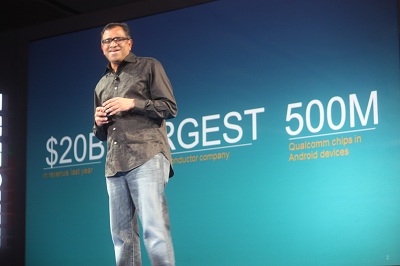VB: It stressed the systems in some ways, though. I can’t get good voice service in a lot of places now. I would point the finger at all the data going everywhere. Anyway, is it hard to predict when this new bandwidth era is going to happen?
Talluri: Not really. It’s fairly simple. You look at LTE, where we were having the same conversation. We’re going to drive 40 megabits a second. I’d see the same question from Engadget or somebody about when we’re going to get it, how we’re going to get it, where we’re going to get it. I mean, right now, in the U.S., you can’t sell a smartphone if it’s not LTE. It’s been two or three short years from time we set out LTE. Now it’s ubiquitous. It’s moved very fast. So these deployments happen rapidly. Operators want to grow their business. They want to invest more.
VB: Verizon is another question, really.
Talluri: Yeah. It’s true that all those things are there. But the reason that you’re not getting it is because people are using it. That means they’re fulfilling a need that exists. Your tolerance level, for example — like when I’m on LTE and this guy sends me a 20-meg Powerpoint and boom, I’ve got it. Nobody even thinks twice about shipping a 20-meg Powerpoint, knowing that I’m on a phone and I’m the road. Nobody worries about it because they know I’ll get it. They know I’ll see it on my smartphone. I’m checking the Powerpoint right back there before the talk. It’s pretty nice.
My point is, are you getting the promised 40 megabits per second for everyone we said we would? No. Are you getting a ton more than you got before? Yes. Have you changed the way you operate because of that? Yes. The same thing is going to happen with this. There’s not much point in fixating on this 150 megabits per second number. Think about four times more than what you get today. Your speed will be four times better. Then, when you eat that up, we’ll have to do one more. [Laughs] That’s how we make a living. We create the need, and we fulfill the need.
 VB: All of these different features you talked about — how would you rate them as far as what’s going to be most important for game developers and gamers on mobile devices?
VB: All of these different features you talked about — how would you rate them as far as what’s going to be most important for game developers and gamers on mobile devices?
Talluri: Right now, I think that game developers on mobile devices are not really taking advantage of all the capability we’ve put in there — all the sensor features, the cameras, the UI, the gestures. Most of them, they just take their console game or some other game and port it to use a touchpad and a small screen. That’s why I liked that “multiplatformization” talk. It’s the first time I’ve seen people realize, “You know what? I don’t really have to just do that. I can do it in different ways.”
People want to hold a tablet in one hand and play with one hand. I think you can do a lot of things like that. The GPS in here is so integrated. You can use locations in so many interesting ways. There are so many sensors in here, and people don’t use any of those. People could use voice to control a game. They could use the gyros to control a game, or the motion and altitude sensors. That’ll happen as more and more people realize that it’s a viable platform for making money, and as awareness of all the things we’ve packed in there grows. We’re doing our part by providing APIs and so forth so people can access those features. Better and better games will come along. We’ll get to the point where a lot of things will be developed for mobile first, instead of ported. It’s just a question of time. We’re pretty bullish.
VB: The implications of things like 150 megabits per second — you could get rid of your home Internet, right?
Talluri: Yeah.
VB: Who needs it once you have mobile that fast? How much change are we going to see on that front, as far as mobile breaking out of whatever ghetto it’s in right now?
Talluri: [Laughs] It’s a pretty comfortable ghetto, I have to say. The way I see this is that a lot of people look for something to replace something else. It seems to be the natural tendency as far as how people look at things. “Will mobile make my Internet go away?” The way I like to think about it is … as a user, when I’m at home, I don’t want to think about how I’m connected to the Internet. Am I connected over mobile? Am I connected over Wi-Fi? Am I connected over Bluetooth? Am I connected over a cable modem? Why should I care? Somebody should just provide me a service. I come home and it works.
It already happens like that in the home now. You don’t think about whether your phone’s on Wi-Fi. You turn on your Wi-Fi, set your access point, come home, and it works. I think that’s how it’s going to be. When you have a better connection like LTE Advanced or whatever, when it’s got a better economic model, you’ll get that. If you’ve got a cable modem that’s working, you’ll get that. Or you’ll combine the two in some way. I don’t think any one thing will replace the other. All these things will work to a point where the consumer benefits by getting good speeds.
